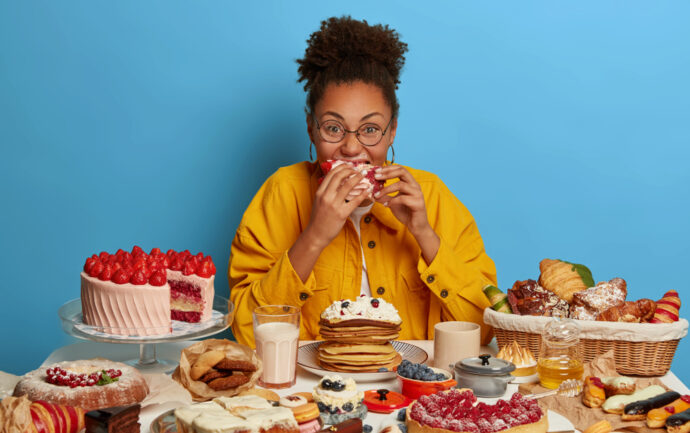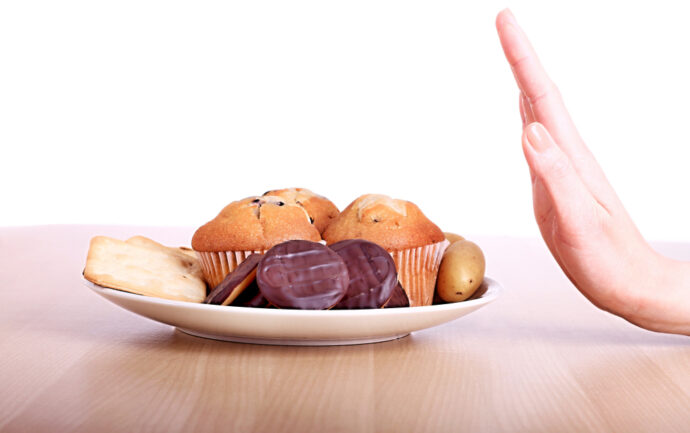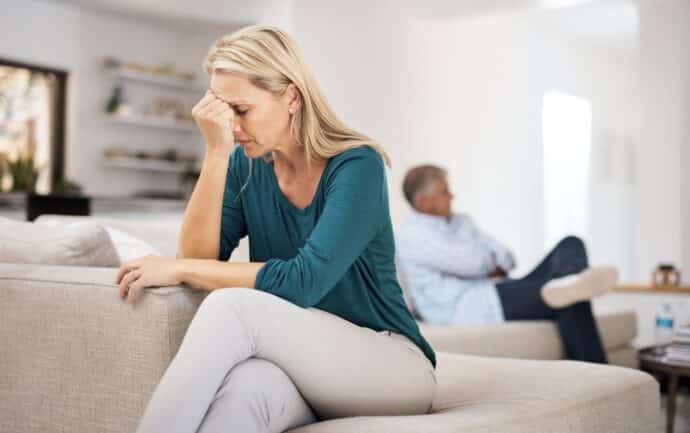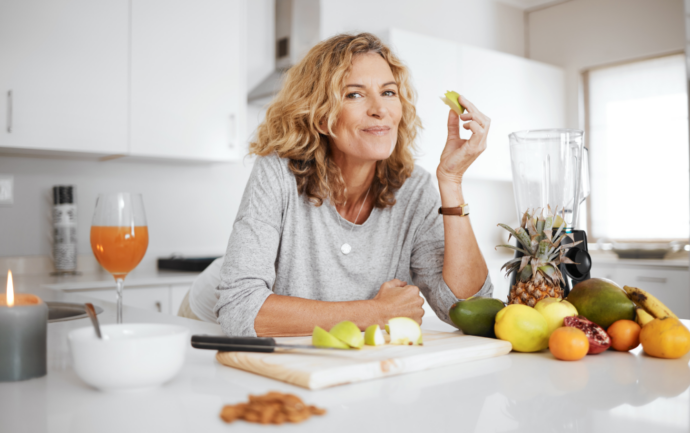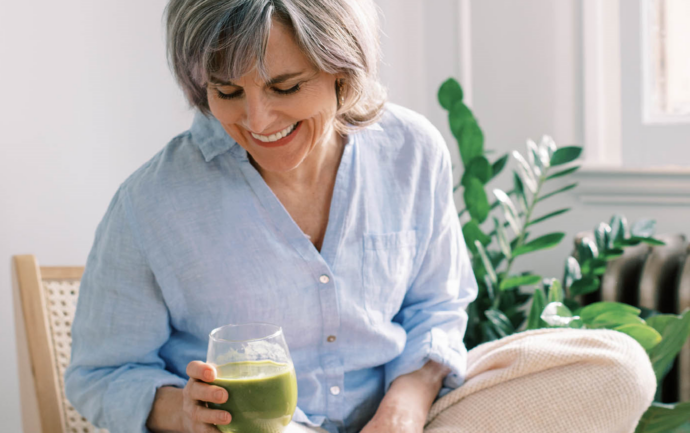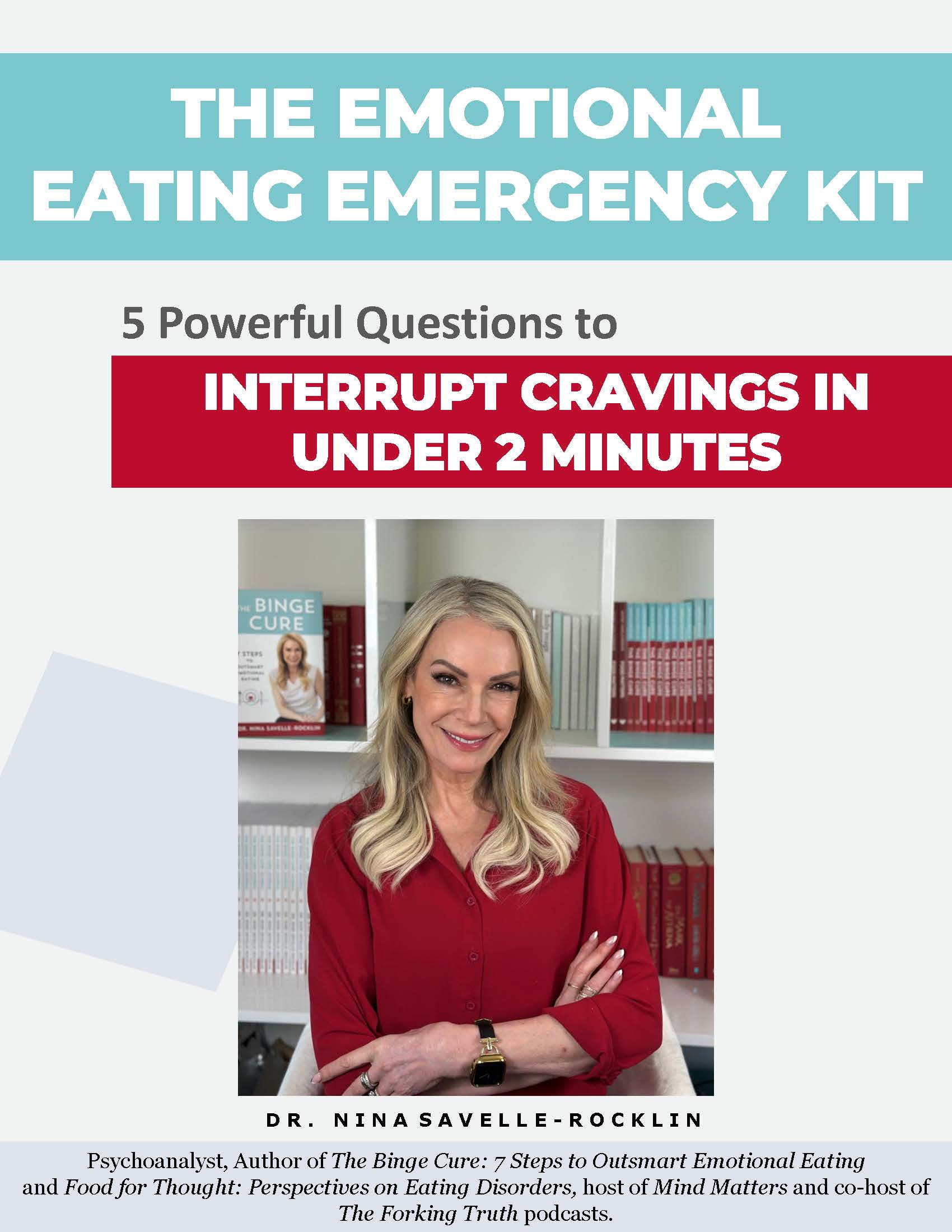Dr. Nina Savelle-Rocklin
Guilt Be Gone: Cultivating a Lighter, Happier You
Table of Contents
- Joan’s Story:
- Let Go of the Diet Mentality
- Change Your Mindset
- What’s Eating “At” You?
- Mary’s Story:
- Guilt vs. Shame
- Get Rid of the Guilt
- Cultivate Self-Compassion
- FAQ:
Ever get that twinge of guilt when you indulge in something with a carb? Something on your “I shouldn’t eat this” list.
Or maybe you set ambitious exercise goals, getting all pumped up, but then… life happens and you fall off the workout wagon. That constant cycle of setting intentions and not sticking to them can make us feel guilty.
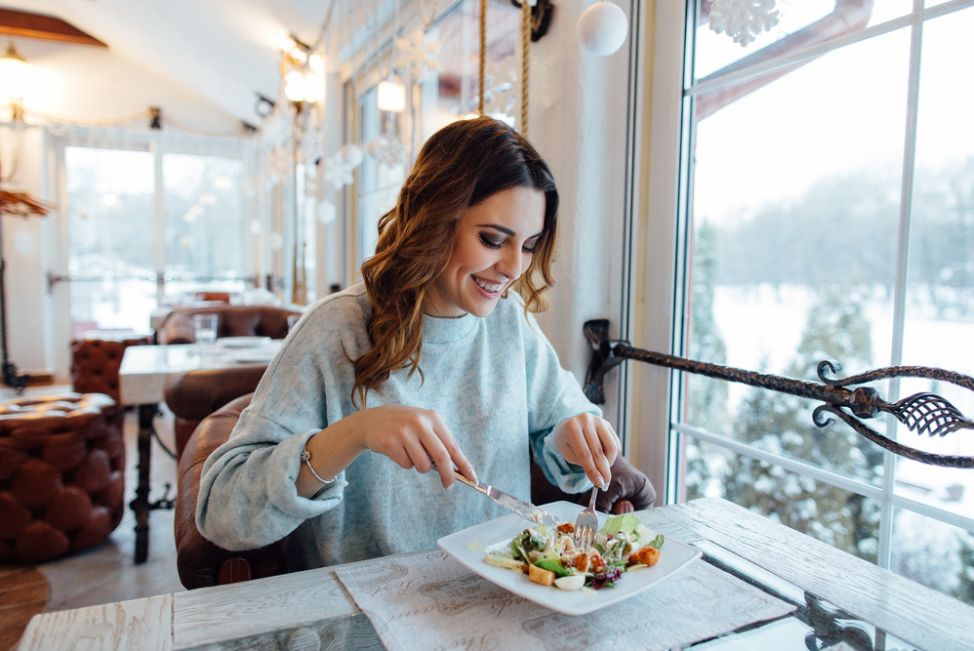
Guilt can be about something that you did or didn’t do. You feel guilty when you think you’ve done something wrong, like eating cake, or when you choose not to take action, like not getting on that Pelaton or going to the gym.
Often, guilt over food can distract us from deeper conflicts or emotions. Guilt also affects our emotional and physical health, and influences our self-esteem, relationships, and general happiness.
In our relationship with food, it’s important to examine what’s weighing on us. When we lighten the burden of guilt, we free ourselves.
Joan’s Story:
Joan loves taking her weekly pottery class on Saturday mornings. It's a relaxing, therapeutic hobby where she loses yourself in the art of molding clay. She’s been doing it a while, and she’s created some pretty decent bowls.
Yet every time she finishes a class, she feels guilty. She said, “While I'm here enjoying pottery, my husband’s home alone. He’s probably lonely and upset that I’m not around.”
Joan felt guilty about taking some personal time. That night, she ended up eating dessert and feeling guilty about going “off track” (as she put it).
Then, since she figured she’d already “blown it” (again, her phrase), she went through a whole bag of tortilla chips. The next day, she felt guilty about what she ate.
Joan’s initial guilt over not being with her husband, who doesn’t enjoy being alone without her, was displaced into guilt over food.
And why did she eat chips? In my research I have found that when people choose to eat chips when they are upset, they are feeling some form of anger, such as frustration, irritation, anger or rage.
In Joan’s case, she resented that her husband never joined her in activities outside the house. She also knew he had social anxiety. Since she understood why he doesn’t take part in activities, she believed she didn’t have the right to be upset.
As with Joan, our guilt over food often masks deeper conflicts or emotions. It's important to identify the root cause of guilt so that you can deal with it effectively and banish it for good.
Take a moment to think about the source of your guilt. Is it because you ate something you think you shouldn't have eaten? Or, is something else weighing on your mind? It’s important to challenge some rules that lead to food guilt, as well as examine what might be underneath that guilt.
Let Go of the Diet Mentality
If you've ever felt guilty for eating a “bad” food, you're not alone. For decades, the $60 billion diet industry has promoted certain foods as “healthy” and others as “unhealthy” as a way of selling products and services.
This has led to millions of people fearing and avoiding certain foods, thinking that they're inherently harmful or will lead to weight gain.
We've been conditioned to think that certain foods–like pizza, cookies, and chips–are inherently bad, while others–like kale, quinoa, and salmon–are inherently good.
Pizza may not be as healthy as salmon, but it’s not a “bad” food, anymore than salmon is a “good” food. The good/bad food mentality is not only unhelpful, it is harmful, especially if you struggle with binge eating.
Guilt and anxiety about food can trigger a binge. The anticipation or experience of deprivation only makes us want something more. When we see certain foods as “forbidden,” we're more likely to crave them and feel out of control around them when we finally eat them. This can create a diet-binge cycle that causes guilt and can be difficult to break out of.
Change Your Mindset
Here are a few tips to let go of the good/bad food mentality and develop a healthier relationship with food:
Challenge your food rules. Take some time to reflect on the food rules you follow, and ask yourself if they're really serving you. Are they helping you feel nourished and satisfied, or are they causing guilt and anxiety?
Practice self-compassion. Instead of beating yourself up for eating a “bad” food, remind yourself that it's okay to enjoy all foods in moderation.
Focus on balance and variety. Rather than trying to cut out entire food groups or avoid certain foods, create balance and allow yourself to have a variety of foods that you enjoy. Some may be healthier than others, but that’s okay. When we have permission to eat what we want, we invariably eat less.
What’s Eating “At” You?
As with Joan, there may be other reasons you’re feeling guilty. If you weren't stressing about food, what do you think would be on your “feel guilty about” list? Understanding the different types of guilt can help you identify what’s going on with you.
Depletion Guilt:
This involves a sense that if you do something for yourself or meet your own needs, you’re taking something away from others, depleting them in some way.
In Joan’s case, by going to her pottery class, she felt like she was abandoning her husband. Some other examples of depletion guilt include these:
- If I leave my husband, he’ll be miserable. I can’t do that to him.
- I’m turning down that great job in Chicago. My mom was so upset when my sister moved to New York. I can’t do that to her. I’ll stay in L.A. even if it’s not the right thing for me.
- I want to be an artist, but my parents will be so disappointed if I don’t go to law school. They’ve been counting on me to join the family law firm since I was born.
Self-Guilt:
This is the guilt you feel because of actually being or existing in the world, for having any needs. The sense is that by needing anything—food, nurturing, comfort, security, and love—you’re exposing a deficiency in yourself, and even a belief that it’s fundamentally wrong to have needs.
Self-guilt sounds like:
- I shouldn’t be so hungry/tired.
- I’ll go to whatever movie/restaurant/vacation you prefer. It makes no difference to me where we go.
- Sure, I’ll babysit for you tomorrow night. It’s not a problem to cancel my plans.
This often involves a sense that your needs/wants will be burdensome to others, and going out of your way to put the needs of others before your own.
Mary’s Story:
Mary often put the needs of others in front of her own. She once canceled her own dinner plans so she could help out a friend who had a babysitting crisis.
Her pattern of giving up herself to take care of others led to feelings of emptiness.
She felt sad and upset because she was always sacrificing for others, but her relationships were not reciprocal. She gave and gave, and others took and took. Mary took care of other people and then food took care of her by providing comfort and filling a void.
When Mary began prioritizing herself instead of sacrificing herself for others, she felt more fulfilled and stopped bingeing for comfort and to fill a void. Instead of seeing self-care as indulgent or selfish, and feeling guilty, she realized it was a necessity.
Moral Guilt:
This arises when we violate our moral code or ethical standards, such as telling a lie or stealing. Like, maybe you told a little white lie or took something that wasn't yours? That's what this kind of guilt is about.
Survivor's Guilt:
This originally meant guilt experienced by people who survived a traumatic event (like an accident or natural disaster) when others died or suffered. Now it includes the feelings experienced by sexual assault or abuse survivors. They might feel responsible or believe they could have prevented it, even though it's never the victim's fault.
Parental Guilt:
This is felt by parents who don’t think they’re good enough parents and are not meeting their expectations of parenting. Working parents might feel guilty for not spending enough time with their children, for example. This is a form of relational guilt.
Anticipatory Guilt:
This is felt when you think you’re going to do something wrong, even if it’s asserting yourself, even if you haven’t actually done or said anything..
These types of guilt are related to food issues because of the mechanism of displacement. Instead of feeling guilty about something in our lives, we often feel guilty for what we’re eating.
Then, since eating can be a way of comforting or distracting from that guilt, it becomes a vicious cycle.
Guilt vs. Shame
Guilt is different from shame, which is about who you are as a person. Shame has to do with your essential character. Whereas guilt sounds like, “There’s something wrong with what I did,” shame sounds like, “There’s something really bad and wrong with me.”
“I was really bad last night. I ate pizza and cookies.”
If you feel guilty and/or ashamed for eating, what crimes are you accusing yourself of?
If you feel “good” when you eat healthy food and “bad” when you eat something you think you shouldn’t have eaten, then your sense of self is overly tied to food.
If you feel shame for eating pizza, ice cream, or whatever, stop and ask yourself, “Why did I eat it?” What was going on?
And there isn’t anything inherently wrong with eating junky foods. If you eat something decadent every so often and you enjoy it, that’s great. Life is to be enjoyed, and that includes sometimes eating yummy foods that aren’t always super healthy or nutritious.
If you overeat or binge on a regular basis, whether it’s on healthy foods or unhealthy foods, and you’re eating as a way of managing deeper, intolerable feelings, then it’s important to know what’s leading you toward food, rather than focusing on what you’re eating.
Eating as a way of managing emotions is a temporary solution to the problem. It’s not “the” problem.
Get Rid of the Guilt
We feel guilty about eating unhealthy food because those choices are associated with “being bad” while eating healthy food means that we are “being good.” Thought of in this way, what we eat is connected to our character.
When you take a step back and think about that, it seems ludicrous that your goodness or worthiness is tied to what you choose to put in your mouth. Yet we say things all the time that indicate that we see eating as practically a criminal act:
- I was so bad last night. I ate pizza.
- I’m hungry for fried chicken, but I’ve been so good today I don’t want to ruin it.
- I can’t eat in front of my friends. They’ll think I’m a pig.
How you relate to your emotions, needs, wants, and thoughts reveals a lot about your relationship to different aspects of yourself.
There are three basic parts: the Self, the Prosecutor, and the Defense Attorney.
The “Self” refers to the part of you that has needs, wants, wishes, emotions, and conflicts. When you say, “I was feeling mad/sad/glad/afraid,” that’s your “Self” talking. It’s usually the part that is vulnerable to judgment and criticism.
The “Prosecutor” is relentlessly critical, finding fault with your thoughts, feelings, wishes, and needs. When you refer to yourself in the second person (calling yourself “you”), it’s usually the critic talking.
The “Defense Attorney” is the part that can be calm, understanding, and supportive. Often, that’s the part that can show up for other people but not for you. Many people relate to their friends and family in a warm, open way but cannot be as accepting of themselves as they are of others.
Ideally, when you experience a need, wish, emotion, or conflict, you respond with comforting or soothing words. All too often, things aren’t ideal.
When you don’t know how to soothe yourself, you’re more likely to turn to food for comfort. That in turn leads to judgment (“How could you have eaten that?” or “You failed!”) and the cycle continues. Responding to yourself in a soothing way is the key
Cultivate Self-Compassion
Self-compassion involves treating yourself with the same kindness and understanding that you would offer to a friend. When we practice self-compassion, we create a healthy relationship with ourselves rather than one filled with guilt and self-criticism.
Many people struggle with negative self-talk, especially when it comes to food and body image. The way you talk to yourself determines the way you feel about yourself, and the way you feel about yourself affects the way you eat.
When you speak to yourself negatively, you not only make yourself feel bad, but you also make it more likely that you will use food for comfort or distraction.
When you tell yourself that you're a failure, or that you have no willpower, you feel terrible and just may turn to food to escape your own mean voice. On the other hand, when you talk to yourself with kindness and compassion, you feel better.
The first step in changing your self-talk is to identify it. Pay attention to the things you say to yourself throughout the day, and try to pinpoint the negative messages. Once you know what you're saying to yourself, you can challenge those thoughts.
Ask yourself, “Would I say this to a friend?” You'll likely find that many of the negative things you say to yourself are harsh. For example, if you tell yourself that you're disgusting because you binged on doughnuts, ask yourself what you’d say to a friend who did the same thing.
Would you be disgusted with your friend for bingeing on doughnuts? Of course not. You’re be understanding and sympathetic. Cultivate the same response to yourself.
Also, practice self-compassion. Be kind to yourself, even when you do something you wish you hadn’t done. Remember that doesn't make you a bad person; it makes you human. Give yourself the same level of compassion and understanding that you give to your friends and loved ones.
The way you talk to yourself matters. Negative self-talk can lead to binge-eating or emotional eating. But it doesn't have to be that way.
By challenging these narratives, practicing self-compassion, and creating a positive mindset, we can cultivate a guilt-free life, leading to a happier, healthier, and lighter version of ourselves.
FAQ:
- Q: How does guilt affect our relationship with food and overall well-being?
A: Guilt over food can distract us from deeper conflicts or emotions and negatively impact our emotional and physical health. It can also influence our self-esteem, relationships, and general happiness. - Q: Why do we often feel guilty about indulging in certain foods?
A: Society has promoted a “good/bad” food mentality, leading us to believe that certain foods are inherently bad and should be avoided. This mindset can trigger guilt when we consume foods considered “unhealthy.” - Q: How can I let go of the guilt associated with food?
A: It is important to challenge food rules and develop a healthier relationship with food. This includes practicing self-compassion, focusing on balance and variety, and letting go of the diet mentality that categorizes foods as good or bad. - Q: Are there underlying reasons for feeling guilty besides food-related issues?
A: Yes, guilt can stem from various sources. It may be related to depletion guilt (feeling like you're taking away from others), self-guilt (feeling guilty for having needs), moral guilt (violating personal ethical standards), survivor's guilt, parental guilt, or anticipatory guilt. - Q: What is the difference between guilt and shame?
A: Guilt is associated with feeling bad about something you did, while shame relates to feeling that there is something inherently wrong with you as a person. Guilt is about actions, whereas shame is about one's character.
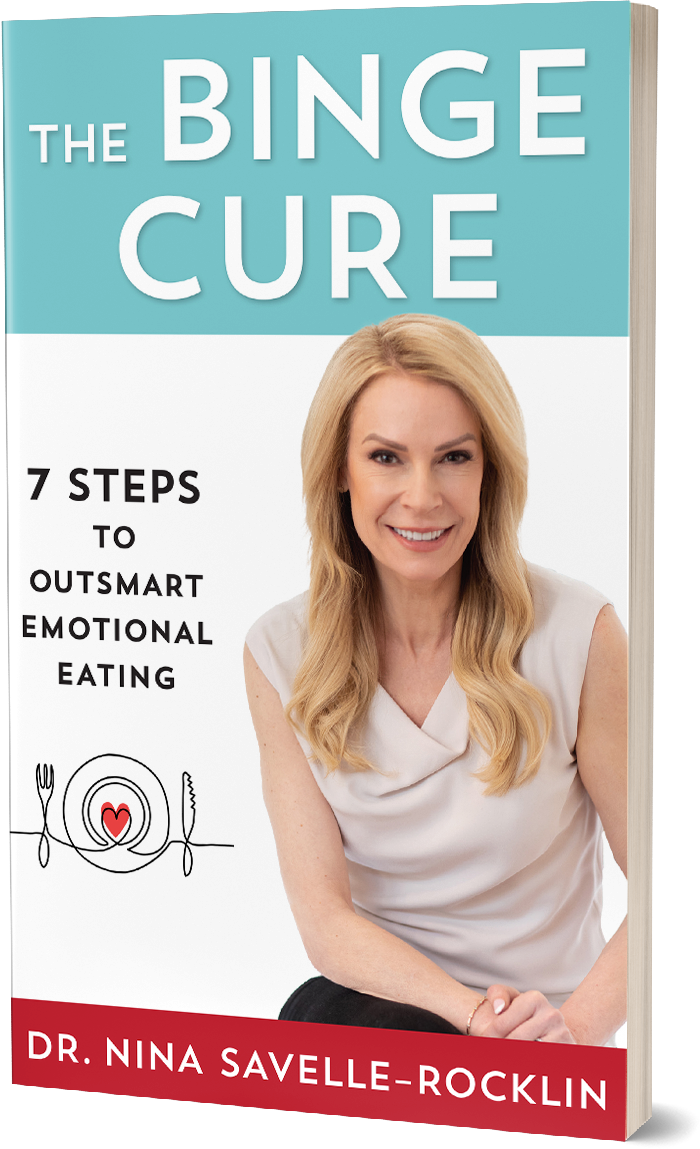
Sick of obsessing about every bite?
GET THE CURE
The Binge Cure Book!
Enter “CURE” to receive a 20% discount.
I’d love to conquer binge eating by ordering Dr. Nina’s book, The Binge Cure!
No, I don’t want access to this terrific resource to help me overcome binge eating.
The Author

Dr. Nina Savelle-Rocklin is a renowned author and podcast host and one of the nation’s leading psychoanalysts known for the psychology of eating. Her signature message of, “It’s not what you’re eating, it’s what’s eating ‘at’ you” has resonated with hundreds of thousands of listeners from around the globe in 40 countries. As founder of The Binge Cure Method, she guides emotional eaters to create lasting food freedom so they can take back control of their lives and feel good in their bodies.
Related Blogs



